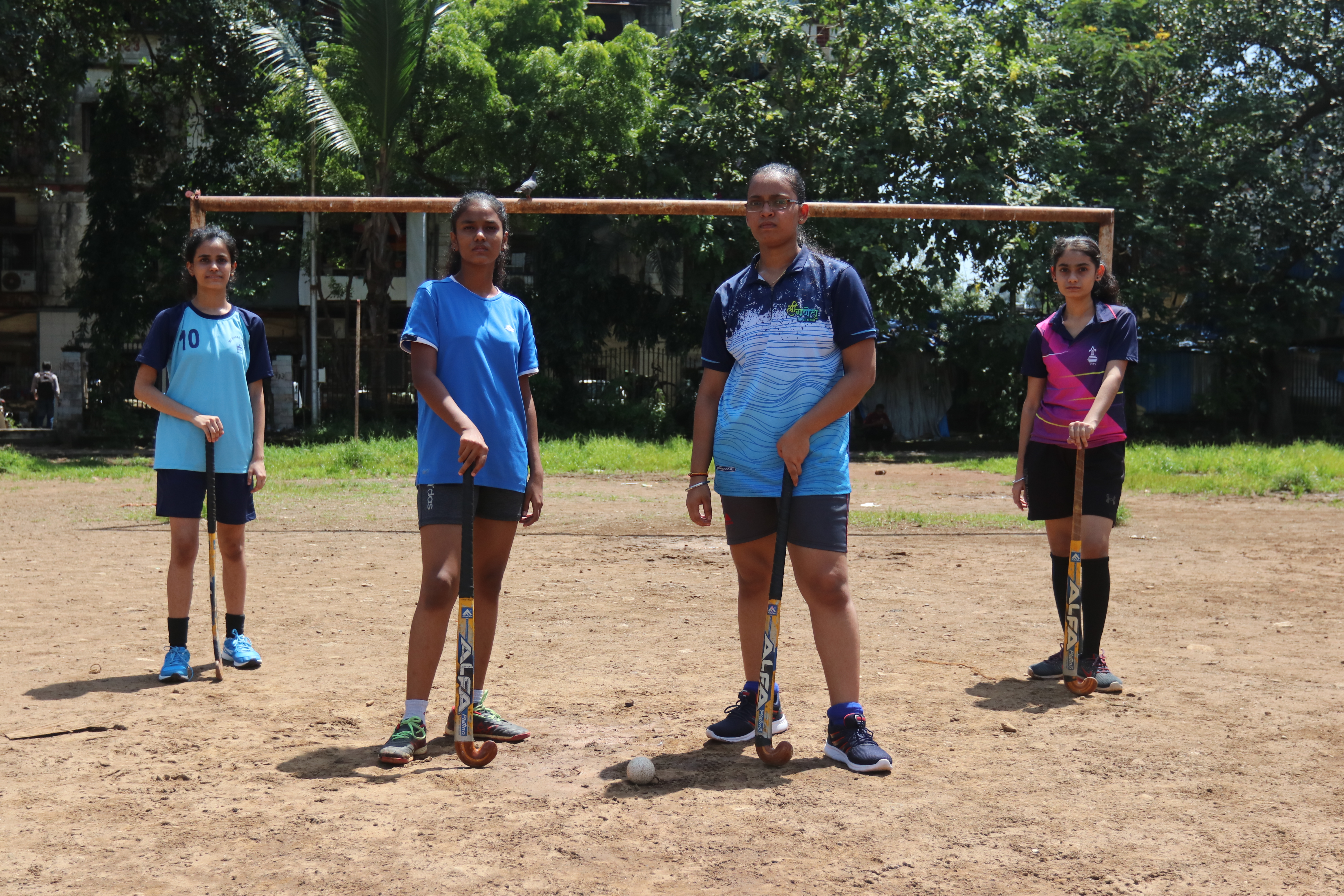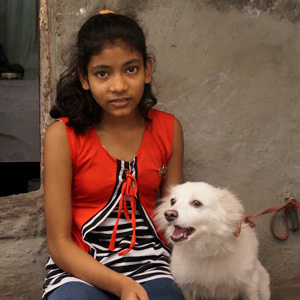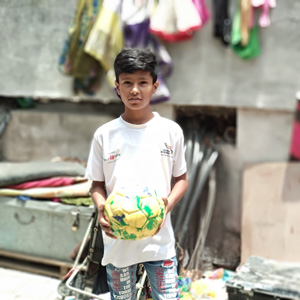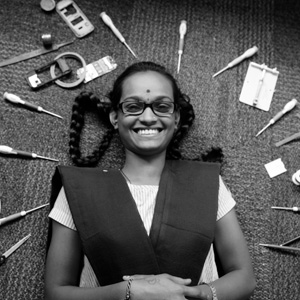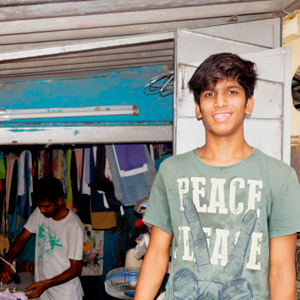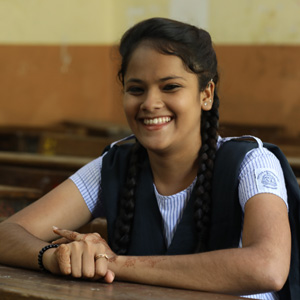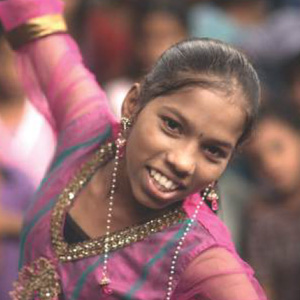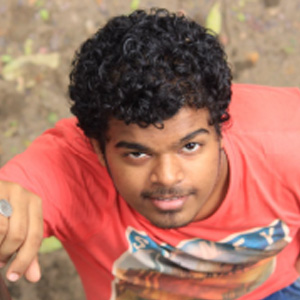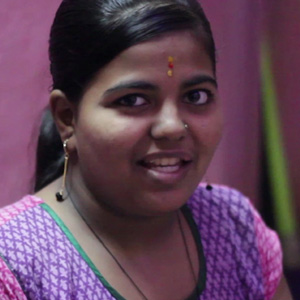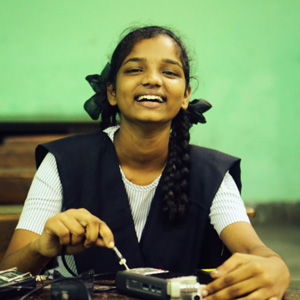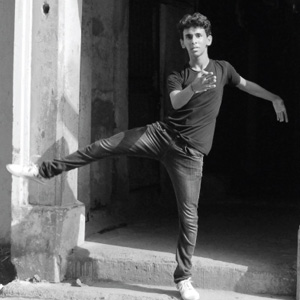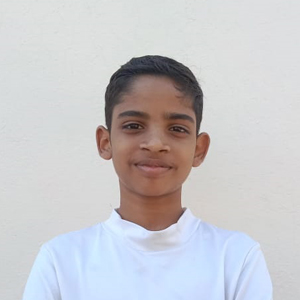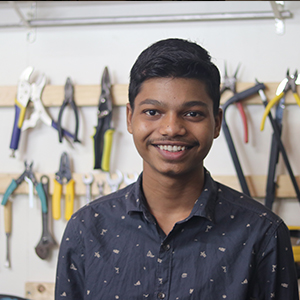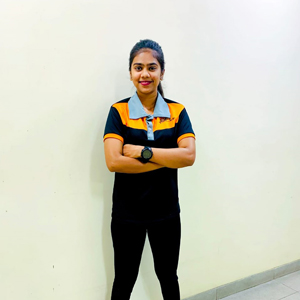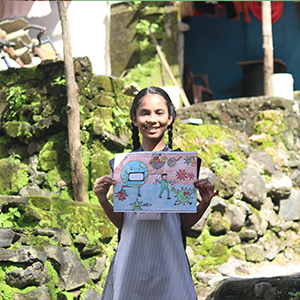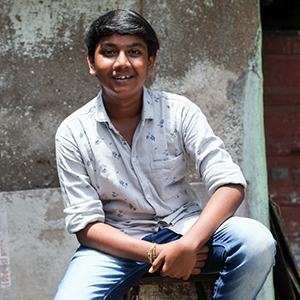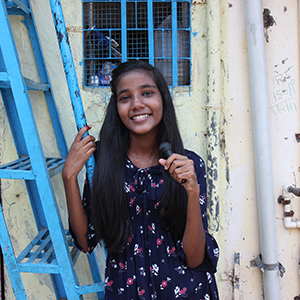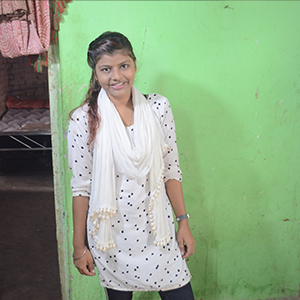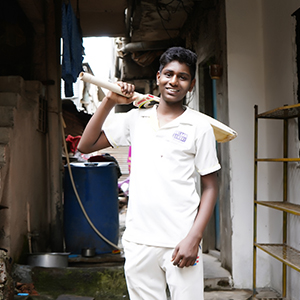Mahesh Dhotre:
Mahesh Dhotre finally got a chance to be trained as a cricketer, and he wasn’t going to let a pandemic get in his way. At first, his family did not share his enthusiasm. He needed his sister’s phone for online training exercises. And his home, which was already too small for his family, could barely contain his vigorous practices. Undeterred, Mahesh started practising on the empty streets, and made the most of what little time he had with the phone. Eventually, after attending his online classes and seeing how they motivated Mahesh to perform well in school too, his parents began to relent. Soon they became ardent supporters and struck upon the perfect solution. His family invested in a phone for him and he was sent to stay with his aunt. There, in a large village field, Mahesh practices to his heart’s content.
Sabha Shaikh:
When our facilitator called Sabha to ask her if she was interested in joining a skills@school course, she felt something she hadn’t felt in a long time – hope. Like many of our students’ parents, Sabha’s father lost his job during the pandemic. As humble as her family’s quarters in Mumbai was, they knew they could not afford to live there anymore. They had just returned to their village in Uttar Pradesh with what little they had when Sabha received the call. Sabha excitedly signed up for the Beauty & Wellness course and when her kit arrived, she put her new skills to work. Now, I can help my family with my earnings," beams Sabha. "Last year, I felt so lost. Now I feel like I have a future."
Kirti Patwa:
Like many of our students, Kirti did not have an internet device of her own. “But my sister shares her phone with me!” she says cheerfully. “It’s more her phone than mine now,” says her sister in mock exasperation. Then adds, trying in vain to hide her pride, “She’s always doing something. She made a video for Independence Day, recorded stories for Amar Chitra Katha, she was even a citizen journalist for Radio Mirchi.” “I also made an animation film, remember?” says Kirti. “I thought I’d be bored out of my mind during lockdown, but I always have something to do.”
Chetan Wagh:
The film industry may be a difficult world to break into, but young Chetan Wagh is nothing if not determined. “It’s always been a dream of mine,” he says with infectious optimism. He approaches each opportunity with earnestness that belies the challenges of entering the dauntingly exclusive industry. “It’s important to keep working,” he says. And so, he does. When he isn’t involved in Salaam Bombay projects like voice acting for Amar Chitra Katha’s audio stories, he attends casting calls for various roles. Most recently, he got a role in the Marathi film The Disciple – the first Indian film to be featured in The Venice Film Festival since Monsoon Wedding in 2001. It may be a long and difficult journey, but Chetan loves every step of the way.
Shreya Ghadigaonkal:
“Aunty please wear a mask like this,” says Shreya, emphatically pointed at her chart on pandemic safety, “Your pallu is not enough.” Shreya Ghadigaonkal may be all of thirteen years old, but she is becoming something of a voice of authority in her chawl. Her father couldn’t be prouder. “After she learnt about safety practices, she has been making these charts,” he says showing off her carefully drawn diagrams, “Her mission is to inform as many people as she can. But safely and from a distance,” he adds quickly. “It’s important for all of us to stay safe and healthy,” chimes in Shreya. “After all, the community’s health is our strength.”
Pragati Mane:
It may be 2022, but many of our students come from neighbourhoods where the idea of girls playing sports is frowned upon. And yet, Pragati walked down her narrow streets – head held high, hockey stick in hand. Ever since she joined the hockey programme at our Sports Academy, she felt her confidence grow. With every swing, she defied gender norms and asserted her independence. As her interest in the game grew, it began to branch out. Pragati found herself drawn towards fitness and soon enrolled herself into our fitness programme. Eventually, she learnt enough to become a trainer herself and secured a job at a leading gym. Pragati has grown stronger in more ways than one.
Rohit Sathe:
The spark was lit at a young age. While Rohit dreamt of becoming a cop, his mind was filled with the robots he saw in cartoons. As much as he loved them, they were as real to him as unicorns and superheroes. It wasn’t until the 9th grade that he saw the stuff of his imagination enter reality. While Robotics is inaccessible to most children in India, skills@school brought the programme to Rohit’s school, and a new dream was born. Despite not having access to the equipment and technology before, he began to display a proficiency that can only be born out of true love for the field. The programme also encouraged him to develop his critical thinking and problem-solving skills. Soon, he and a few of his classmates found themselves in major robotics competitions culminating in the First Tech Challenge which saw the participation of over 40 schools. Here, Rohit was part of a team that raced to the semi-finals. The team won the 6th place, but their joy surpassed everyone else’s. Rohit still beams at the memory. And does he still want to be a cop? “Yes!” he answers emphatically. But I want to do something with technology. Maybe I’ll join cyber security.”
Kavita Choudhary:
Everyone who knew Kavita Choudhary, always expected great things from her. But what? Though she was a bright young girl, she lacked direction. That is, until she found her way to our Media Academy. Noticing her talent for imitation and voice modulation, her trainers encouraged her to practice as a voice-over artist. And that untapped talent finally found an outlet. The academy provided her with opportunities to act as an MC for events (which got her noticed), to audition and perform as a voice actor, and hone her skill for self-expression through different mediums. Now Kavita has lent her voice to 12 animated movies, written 13 articles that have been published in newspapers, and developed a regular circus of characters for her voice acting projects. This academy was created to help students find their voice. In some cases, it’s more than just one.
Raj Rathod:
Young Raj Rathod has more persistence than his tiny frame can contain. His participation in his school’s Super Army programme had kindled a spark of leadership. And soon he was all afire with a desire to spread awareness on the dangers of tobacco. And that is how the 12-year-old found himself face-to-face with a tobacco vendor in his neighbourhood. Well, face-to-torso. The vendor had decided to combat the young man’s arguments to display posters with pointed indifference. “Uncle, did you know tobacco causes cancer? Did you know it’s illegal to smoke if you’re under 18? Look! It’s all on my poster!” The fact that the vendor dismissed him like the others in the area didn’t faze him. He just tried a different approach. For days Raj cajoled, charmed, argued and pleaded only to be ignored, reprimanded, or sent away with a patronising pat. Eventually, the young man’s charm and persistence chipped away at their defiance. The first vendor put up a poster with a gruff appreciation of Raj’s determination. Soon, others in the neighbourhood followed suit. Like so many of our students, Raj learnt that changing the world, begins with changing one mind.
Deepali: The determination to dance to her own tune
Not encouraged to speak, dissuaded from expressing her everyday thoughts, Deepali grew up in a world of silence. A student of the Salaam Bombay Foundation Dance Academy, Deepali began to use her hands, her eyes, her feet to do the talking. Soon she found her hours of dance practice a liberation, an avenue for expression. No longer did the burden of household chores weigh her down, for she had something to look forward to, a space where she was Deepali the dancer and not Deepali the older sibling, Deepali the water bearer, Deepali the cook or Deepali the cleaner. Her journey from silence to vibrant expression did not go unnoticed. Soon Deepali was one of the chosen to undergo special training at a prestigious dance institute in Mumbai as part of her course work with the Salaam Bombay Dance Academy. Today, Deepali is a qualified peer trainer at the Shiamak Davar Institute of Dance. She goes to school, fulfills her household duties, contributes to the family income. Deepali found her voice.
Sanket has learnt to pull the right strings
It was in standard 9 that Sanket Gurav was first exposed to puppetry. But unlike other kids, the puppeteer held his attention more than the puppets or the story they told. The thought that he could control their destiny and could weave whatever magic he wanted into their lives, held immense possibilities for this 14 year old. On that day, Sanket made a discovery for himself that was to have a life long impact – he wanted to be a puppeteer, he wanted to tell stories, he wanted to be the master.
Sanket’s story is that of many adolescents in the Salaam Bombay Foundation Academies. From a resource poor background, growing up in one of Mumbai’s over-populated slums, Sanket attends the local public school. He is also part of the Salaam Bombay Foundation Academy of the Arts, specializing in Theatre. Financial constraints drove the family back to their village where Sanket had little opportunity to pursue his passion for the stage. But as fortune would have it, the family returned to Mumbai and Sanket picked up where he left off. His passion and zeal for puppetry were cultivated by the Salaam Bombay Foundation facilitators and he was encouraged to participate in as many state and national level competitions. His prize money even enabled him to fund his father’s medical treatment and today, his father is once again an earning member thanks to Sanket and his puppetry.
Sanket plans to fund his college tuition with money he earns from private performances and prize monies. A humble school boy, once denied his basic right to education, he is today a young adult filled with hope, determination and the skill to be a positive contributor to his family and society.
Sanket is an example of how adolescents can change their world if given the right tools and opportunities.
Samirul Shaikh:
Eighteen year old Samirul Shaikh lives in a family of four, including his parents and a younger brother. His mother works as a housekeeper and his father, a daily wage labourer. Given the nature of his father’s job, Samirul spent most of his life migrating from one construction site to another.
Before Samirul started his journey with Salaam Bombay Foundation, he had not discovered his purpose in life. He was in the 9th grade at Mahim Municipal School, when his teacher first saw him playing cricket in his classroom, using a paper ball and bat. Once he was enrolled in the cricket academy and given professional training in the sport, he was never the same again. “I used to think I am a better batsman, but I realized that bowling is my forte.” Cricket has led him on a pathway to self-discovery. He recognized traits about himself that he never knew existed.
When given the task of assisting twenty-one students, from the under-14 age group, travel across the city for their matches, he fulfilled his responsibilities head on. Not only did he ensure their safety in the crowded local trains of Mumbai, but also did he keep all the parents updated about their whereabouts, every step of the way. In the process, he developed qualities of management, hard work, communication and leadership. Before joining the cricket academy, Samirul used to be meek and shy, having little or no confidence. He is now a compassionate and responsible adult who can make his own decisions. Being a sports player, he has grown to learn that his only competition should be his own self.
This is something that sets him apart from the crowd.
Sakshi Kasare:
When Sakshi Kasare was enrolled in Salaam Bombay Foundation’s theatre academy, she was not sure whether it was meant for her. She had always been a quiet and self-contained girl, who would mostly keep to herself. With the support and encouragement of her mentor, she took the plunge. From then on, there was no looking back. She learned everything from facial expressions and body language to presence of mind and voice modulation.
Her first stage act was a mime, performed at the National Centre for the performing arts (NCPA), where she won the best actress award. When her photograph was printed in the newspaper the next day, she knew this was something she wanted to do for the rest of her life. She continued to win awards thereafter but did not let success get to her head.
Sakshi’s life, however, was not a cakewalk. She encountered multiple challenges during her journey. Her family includes eleven members: All of them live in a small, rented hut in the slums of Mumbai! Her father is a full-time driver and her mother, a home-maker.Despite everything, Sakshi had an unresolved stance. She continued to work hard and never gave up.


